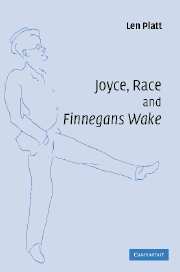Book contents
- Frontmatter
- Contents
- List of abbreviations
- 1 Joyce, race and racism: introduction
- 2 ‘No such race’: Finnegans Wake and the Aryan myth
- 3 Celt, Teuton and Aryan
- 4 ‘Our darling breed’: the Wake, social Darwinism and eugenics
- 5 Atlanta-Arya: theosophy, race and the Wake
- 6 ‘Hung Chung Egglyfella’: staged race in Ulysses and the Wake
- 7 ‘And the prankquean pulled a rosy one’: filth, fascism and the family
- 8 Race and reading: conclusion
- Notes
- Index
5 - Atlanta-Arya: theosophy, race and the Wake
Published online by Cambridge University Press: 22 September 2009
- Frontmatter
- Contents
- List of abbreviations
- 1 Joyce, race and racism: introduction
- 2 ‘No such race’: Finnegans Wake and the Aryan myth
- 3 Celt, Teuton and Aryan
- 4 ‘Our darling breed’: the Wake, social Darwinism and eugenics
- 5 Atlanta-Arya: theosophy, race and the Wake
- 6 ‘Hung Chung Egglyfella’: staged race in Ulysses and the Wake
- 7 ‘And the prankquean pulled a rosy one’: filth, fascism and the family
- 8 Race and reading: conclusion
- Notes
- Index
Summary
THEOSOPHY AND THE DUBLIN CONNECTION
It has always been recognised that theosophy was of interest to Joyce, in part because of the well-known local connection. Theosophy was practised by key figures in the Irish Literary Revival. Charles Johnson, under W. B. Yeats's influence, met A. P. Sinnett and formed the Dublin Lodge of the Theosophical Society in 1885, an organisation which according to Edward Boyd, one of the earliest historians of Irish revivalism, was ‘as vital a factor in the evolution of Anglo-Irish literature as the publication of Standish O'Grady's History of Ireland, the two events being complementary to any complete understanding of the literature of the revival. The Theosophical Movement provided a literary, artistic and intellectual centre from which radiated influences whose effect was felt even by those that did not belong to it.’ Yeats, George Russell and John Eglinton, all key figures in the Irish Literary Revival, joined the Society at various times. Both Russell and Yeats knew Madame Blavatsky, its co-founder, personally and both were deeply influenced by her. For seven years Russell was a member of the ‘Household’, a group of theosophists who lived together and formed the nucleus staff of The Irish Theosophist, launched in 1892. This influential journal remained in publication until 1897 when it was replaced by The Internationalist, for which Eglinton wrote a great deal. Thereafter the Irish theosophy movement, in parallel with the wider international movement, went through a number of breaks and schisms.
- Type
- Chapter
- Information
- Joyce, Race and 'Finnegans Wake' , pp. 95 - 120Publisher: Cambridge University PressPrint publication year: 2007



